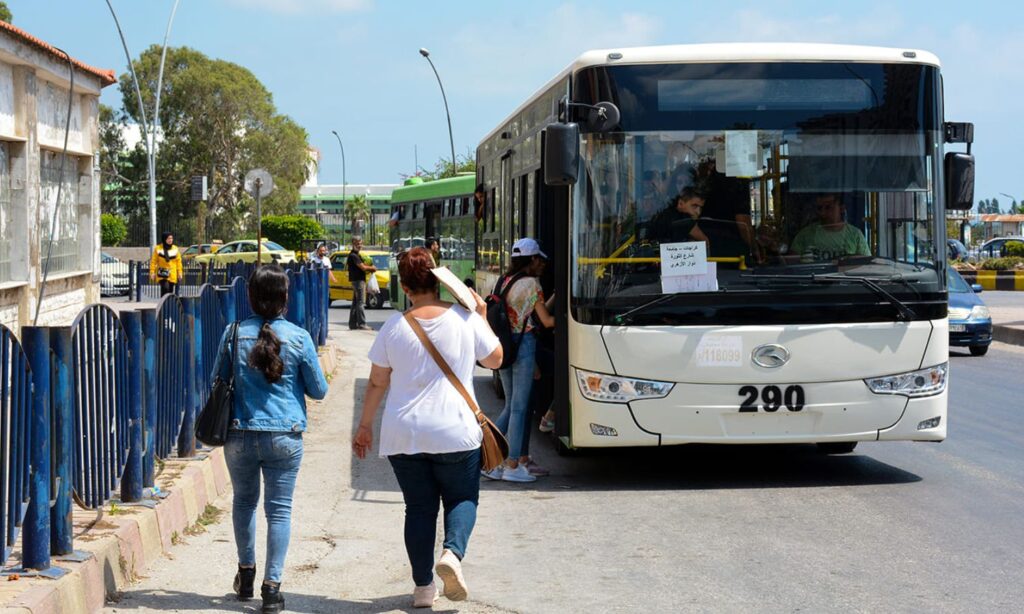Latakia – Linda Ali
All attempts by the 28-year-old Hassan to obtain approval for his resignation request, which he submitted to his workplace in the Latakia Finance Directorate, failed, as all resignation requests were rejected.
The Economics-graduate Hassan (pseudonym), who gets 112,000 Syrian pounds per month (about $10), needs more than 70% of it for transportation fees, being a resident of the remote countryside, and he pays about 3,000 pounds per day for transportation.
With the approval of his department director, Hassan comes in the morning and stays at his job until half past nine, after which he leaves for the restaurant where he works as an accountant in the morning, with a salary of about 800,000 pounds.
“The head of the department takes half of my salary to cover for me. Of course, I excuse him. We all want to live, and the salary is not enough,” he said.
Administrative leave as a solution
Rehab, 28, who is a mother of two children, could not resign from her job as an administrator at Tishreen University, nor even obtain an unpaid leave, because the matter now requires “(illegal) pressure from a senior official in Damascus.” she said.
Rehab’s village is only 12 kilometers away from Latakia, but she needs 2,000 Syrian pounds daily for transportation, which costs her about two-thirds of her monthly salary of 100,000 SYP.
Her problem is not only with transportation, as she has two children (three and five years old) who cannot be placed in a kindergarten, because its annual fee exceeds 800,000 pounds for each of them, meaning that she needs twice her salary to put her two children in a kindergarten, and another double to pay the transportation fees.
Rehab said, “I barely agreed with my boss that I would come to work three days a week, where I would put my two children with my husband’s mother, or bring them with me to work if their grandmother was not available.”
Women suffer great hardship due to low salaries, as the responsibility for children belongs to them according to the customs of society, and this places additional burdens on them in the absence of the “progressive gender role” of the husband, who tries to partner with his wife in solving any problem of this kind.
Common problem
Rural employees are not the only ones who suffer from high transportation costs compared to low salaries, as residents of Latakia have their share of the same pain.
Louay, 46, who lives in the popular al-Montazah neighborhood in Latakia, needs to take two public buses to reach the state-owned Syrian trade corporation, where he works.
The price of a one-ride ticket is 400 pounds, forcing him to pay 1,600 pounds daily, while his salary does not exceed 70,000 pounds, as a loan installment of 20,000 pounds is deducted from him.
Louay said, “The 1,600 pounds may rise to 2,000 pounds, because the internal bus driver often tells me that he has no money to return the change, and does not return the 100 of the 500 banknote that I give him, which is a way of stealing, because he is also an employee like me and his salary is not enough.”
Louay does not work at his place of work for more than an hour, because he works in tracking transactions, which is the work that helps him to feed his family. He added, “They do not allow us to resign, but they will not prevent us from finding an alternative to feed our children. They (government officials) are not hungry yet to feel our suffering.”
Low salaries have spread the sense of consent for “corruption”, and the justification of theft with poverty and low salaries has become common, to the point where corruption is about to become completely legal, according to Louay.
Last June, the Labor Union issued a report, published by the state-run Tishreen newspaper, in which it said that the number of resignation requests increased with the exacerbation of the severity of the living crises.
The report revealed that 516 resignation requests were registered in the governorate, including 230 requests from Textile companies’ workers, and 149 workers in the Tobacco corporation, in addition to 31 workers from health, 58 from the agriculture sector, and 48 separate applications from the rest of the sectors during the first half of this year.
There is widespread anger in Syria over the problem of low salaries, and the continued rise in prices, including prices raised by the government, such as fuel, which in turn led to an increase in transportation fares.
Last June, the Prime Minister Hussein Arnous announced a study to increase the salary, and he told the ruling party’s Al-Baath newspaper at the time, that the study is at its conclusion, and until today, the expected increase has not been issued.
The value of the Syrian pound against the dollar when Arnous made statements was about 7,500 SYP for $1 but this week the value is equivalent to 14,750 pounds.
The average government salary in Syria does not exceed 100,000 Syrian pounds, and according to the Salary Explorer website, which specializes in salary scale figures and wages around the world, the average monthly salary in Syria during 2022 was about 146,000 Syrian pounds.
On August 15, regime’s president Bashar al-Assad ordered a 100 percent salary raise for state employees, retirees, and military personnel, while the government sharply raised fuel prices.

